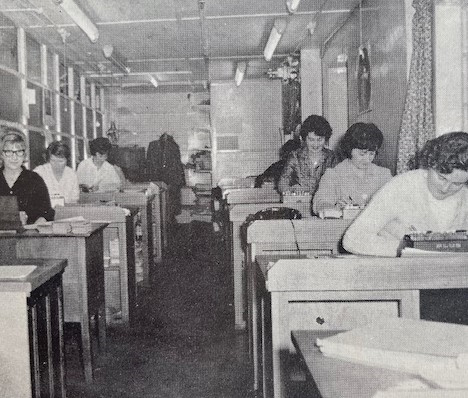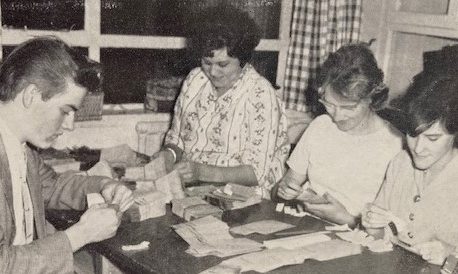So Frank would take me up to Lloyds bank and I’d get out the van and go round, he’d go and turn the van round and come back while I was in there. I’d go up to the desk, and they’d hand me over the money and I put it all in this leather bag and walk out with…lots of money! Didn’t think anything of it in those days really.
[Gloria, Baily’s]
And raw skins particularly, they had different payments because if the skins were bad or they hadn’t been de-fleshed properly, they were given extra money and they earnt it. Or if the weather was bad, they had extra money. If the weather was really hot they had extra money because that was when you really would not want to work down in that department. You had to have a very strong stomach!
[Julia, Morlands]
My money went up to about £7 a week, which allowed me to buy 20 guinea teddy boy suits! I were quite well off, but in hindsight it was a dreadful job.
[David, Morlands]

Photo: Morlands Magazine, Christmas 1962
Then of course you had to fold the wage slips a certain way, and they went into packets with little windows on and you had to fold the notes so that people could check their notes before they opened their packets. If there was any discrepancies, they couldn’t open the packet before it had been checked. We had to make sure we balanced at the end, we didn’t have any money left over, or short or anything. If not, we had to go through all the packets again. So they weren’t sealed until we knew that everything was OK.
[Gloria, Baily’s]

Photo: Morlands Magazine, Christmas 1962
God forbid if there was a note leftover or a note short, or a penny leftover or a penny short. So if one of us had dropped one penny or halfpenny on the floor and they were short, it was all hands on deck to try and find it so we could put it in the wage packet.
[Rosa, Morlands]

